“The three men closest to me have gone to war” – Aliona Danilova, founder of the Ukrainian Women's Battalion
Aliona Danilova's stepfather, husband and 19-year-old brother are all at war. Three generations of men who went to the front to fight as volunteer soldiers, motivated to protect their homes from Russian occupying forces. A month after the full-scale invasion began, Aliona felt helpless, believing that she was not doing enough to help the Ukrainian military.
One night, overwhelmed by despair, pain and tears, an idea came to Aliona: a women's battalion made up of volunteers who want to become a reliable rear guard for the Ukrainian defence. They would help the military by buying bulletproof vests, helmets, thermal imagers, quadcopters, radios, tactical backpacks and first aid kits. Aliona Danilova, founder of the Ukrainian Women's Battalion, talks to Ukrainska Pravda.Zhyttia about her idea and what motivated her to make it happen.
Advertisement:This is her story, in her own words.
My stepfather and brother
It all started with Maidan [the Revolution of Dignity in 2013-2014 - ed.].
I remember sitting in front of the TV with my mother and grandmother watching the news. In Khmelnytskyi Oblast, where I come from, it seemed scary and incomprehensible. I was 16 years old, and I wasn't very politically conscious or patriotic - I hadn't needed to be.
My stepfather went to the front almost as soon as the invasion began, and in February 2015 he was taken captive. We started looking for him, and scammers started preying on us. They told us we had to sell our house and apartment, and that then they would tell us where he is.
I found it interesting that they spoke Ukrainian. My stepfather's parents were desperate and nearly decided to do as they were told, but then for some reason the Russians switched on my stepfather's phone. They probably wanted to find something on it.
That's how we found out that he was alive, and then we found volunteers who could add him to the prisoner swap list. After my stepfather was freed, no one ever asked him about his time in captivity. It was not a policy of silence, but a wish to avoid triggering him.
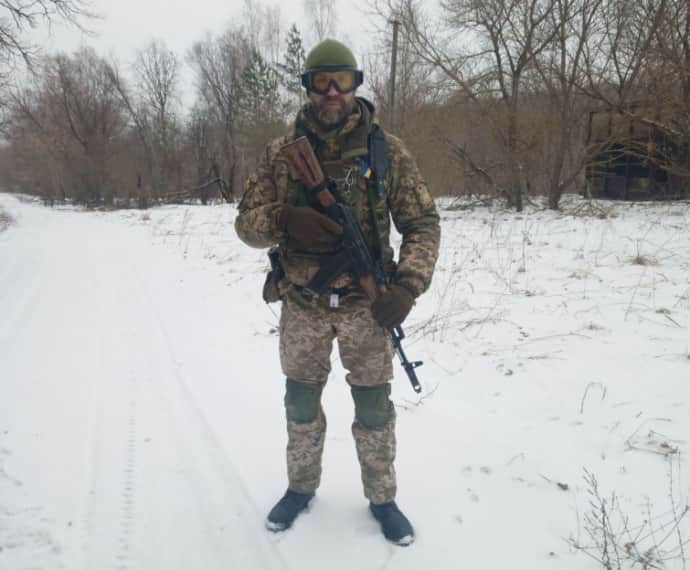 Aliona's stepfather on duty
Aliona's stepfather on duty
After he came back, Cyborgs started appearing at our house, defenders of the Donetsk airport [the term "cyborgs" was adopted in reference to their courage and invincibility - ed.].
They were my stepfather's brothers-in-arms, his friends. My brother (now 19 years old) was finishing eighth grade, but he was doing poorly at school, and my mum was thinking about where to send him next. A year later, my brother made up his mind and said he would join the military like my stepfather.
He went to the Odesa Military Lyceum and then entered the Odesa Intelligence Academy, where he is currently studying. In 2020 no one even imagined that there would be a full-scale invasion. My brother's parents and relatives thought he would complete his studies and then sit quietly in an office, studying theory.
But no one knew then that theory would become practice, and he would never finish his studies. Students at military academies normally sign a contract on arrival. Then, from their third year of study, they are taken on combat missions, afterwards returning to the academy to tighten up their theoretical knowledge before continuing their practical study.
My husband
I met my husband in 2016 at Ostroh Academy.
I was entering my first year, and Zhenia was studying psychology part-time. He was already serving in the military at the time but wanted to pursue a civilian profession as well. He was walking around our student accommodation looking for someone to iron his shirt.
My friend said casually: "Oh, Aliona can do it". She convinced me that it wouldn't take long, and for some reason, I agreed. Fifteen minutes later, there was a knock on our door, and Zhenia came in with a bar of chocolate as a thank-you.
We let him in, and he started telling us stories from the front: how people had died, that one person had been hit so badly there was nothing left of him.
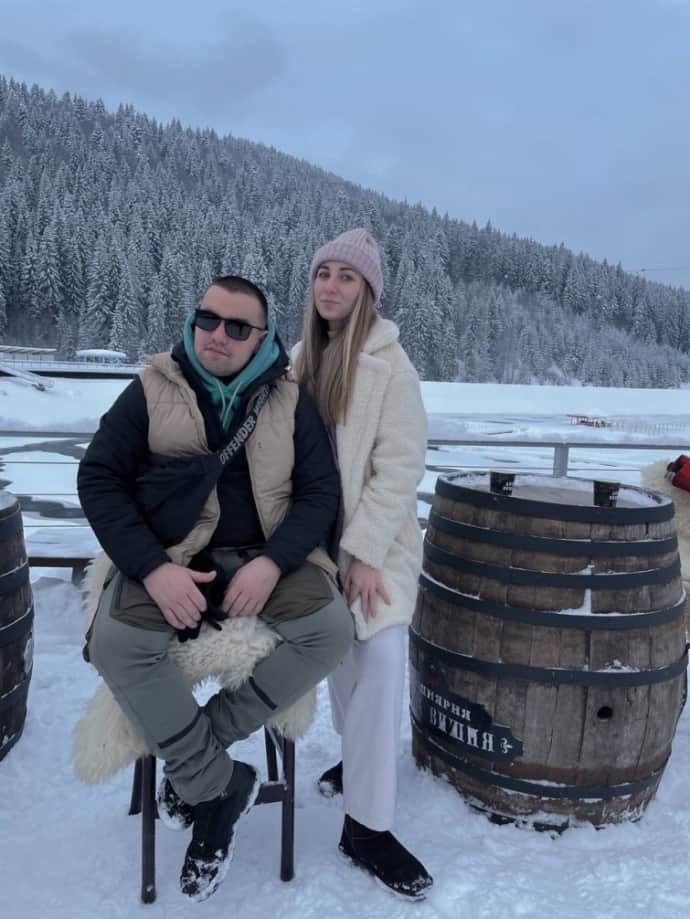
Aliona with her husband Later, my friend and I sat down together and decided that we shouldn't be friends with him, as he kept telling these horrifying stories. Zhenia had followed me on social media, but at the time it didn't seem important.
Three years later, during finals, my friend mentioned the guy whose shirt I ironed. She asked if I had seen that he had been injured. I went on his Instagram and saw a video of him lying in hospital, barely conscious, holding his intestines.
He had been hit by a machine gun: all his organs were injured, they were glued together in pieces. One kidney and spleen had to be removed, as well as a fragment of his liver. I texted him words of support, and we chatted for a while.
Six months later, we saw each other again at the student accommodation: he came back to take his exams and was undergoing rehabilitation. But the conversation didn't go further than hello and a polite chat. While I was studying, I moved to Kyiv, and another guy proposed to me.
My future husband never forgot this. Zhenia told me: "You know I like you so much, I would marry you." I thought he was joking, but he asked me several times a month if I had changed my mind. I came to Kyiv during COVID, got sick and needed to see a doctor.
Zhenia met me at the metro station with a huge bouquet of daisies, put me in his car and told me almost as if it was fact that our next steps would be marriage and starting a family. I still didn't think he was serious, but Zhenia had plans for me. He said he made only one mistake - when he let me go after our first meeting.
From the moment he first brought me to his apartment until now, I always have a bouquet of fresh flowers. He's always there, even when he's far away.
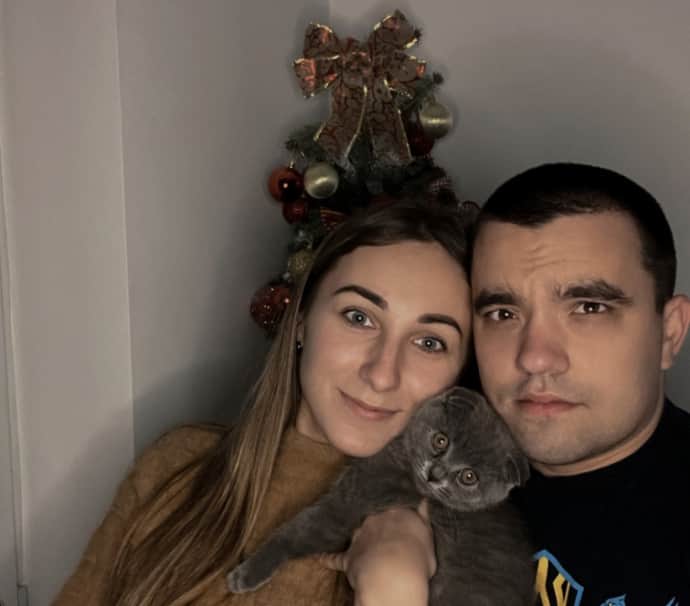 Aliona with Zhenia and the cat
Aliona with Zhenia and the cat
The full-scale invasion: Kyiv
In January and February 2022, Zhenia was preparing for war: he cleaned his weapons, went to a shooting range, and organised his backpack. On the 24th of February, Zhenia woke up around 04:30 and read the first reports of explosions in Kharkiv.
He woke me up and said, "Princess, the full-scale invasion has begun." He was already dressed and ready. At first, I didn't believe it, but I turned on the news and there it was - footage of tanks entering Kyiv and Kharkiv Oblasts. He asked me to go to my parents' house because he was afraid that I might be killed because of my political stance and the photos of us, but I refused.
So my cat and I stayed home, and my husband went to war. Around 6 am, I woke my mother up with the bad news. She didn't believe it at first.
My stepfather was summoned to the city council at 04:30 (Kyiv time) to form roadblocks. At first, they didn't want him to fight because he had already been in captivity. And he and my mother had a daughter, who was then almost five years old.
And so the three men closest to me went to war.
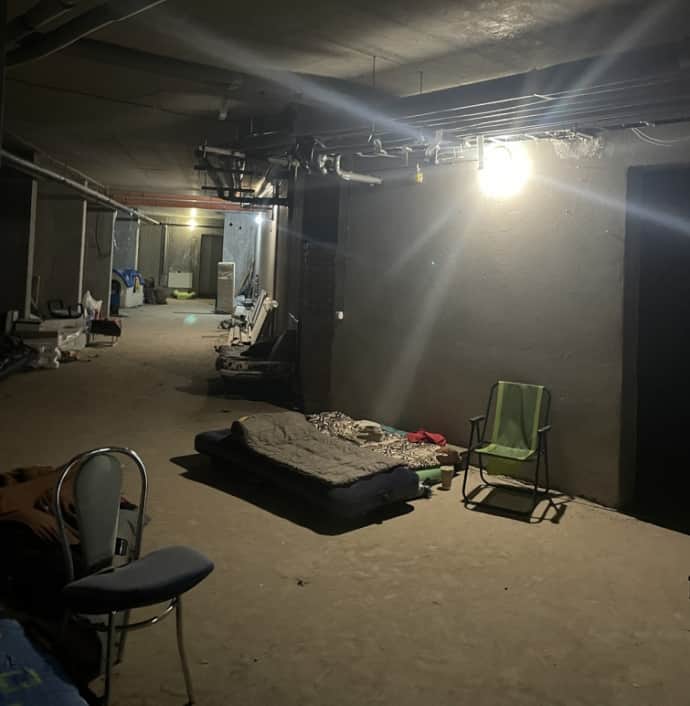 Shelter in Kyiv
Shelter in Kyiv
While I was in Kyiv, my husband and his fellow soldiers came to my place to wash, eat and clean their clothes. For Zhenia, this support was huge. I didn't think about it.
It seemed this was the way it should be: the husband at the front, and the wife helping in the rear. I was doing my best to ensure that this bullshit (the war - ed.) would end quickly. Because the fighting was almost in Kyiv itself, I spent most of my time sitting in the basement with my cat.
Almost all of Kyiv's residents had left: several men of pre-retirement age took on the guarding of our area, along with a security guard and an old lady. The fighting arrived in my area for the first time at the end of March. I stayed in the apartment, feeling the ground and windows shaking.
I thought about leaving Kyiv to visit my parents, but no one wanted to pick people up from my area, not buses or taxis. My mother found a man who took people from the capital to Khmelnytskyi and beyond. But a few minutes before I was due to meet him, he said he was too afraid to go.
My husband was furious when he saw this message, as he is a man of his word. I am convinced that he would help even strangers while under fire.
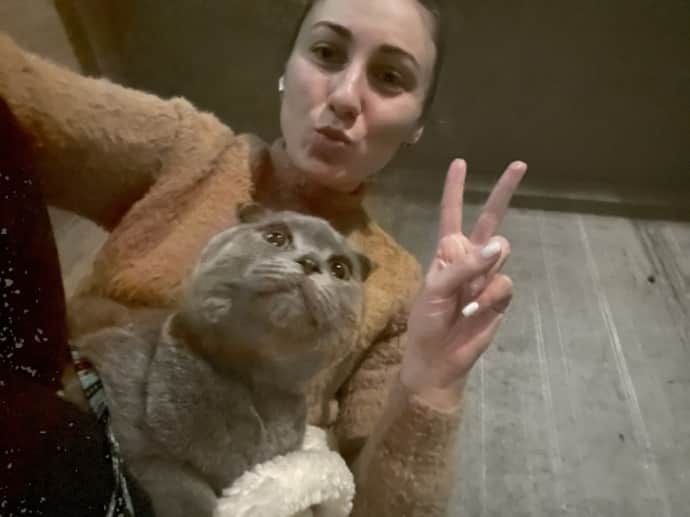 In a shelter with the cat
In a shelter with the cat
I stayed for another day: a neighbour came to visit me and asked me to take her cat while she went to have dialysis done. My patience was running out by the evening, and I called her to ask when she would pick up her cat.
It turned out that she was already in Lviv. So I had two cats, which would make evacuation even harder. Luckily, some of the guys in my husband's unit had to go to Khmelnytskyi Oblast on business and were able to help me escape.
The Ukrainian Women's Battalion
I arrived at my parents' house around the 25th of March and realised that all the men I loved were at the front.
I sat crying in the middle of the night, feeling helpless. Then I created a group on Telegram, where I added all the available women I know. There were around 50 participants.
And that's how the Ukrainian Women's Battalion was created. The women quickly divided up responsibilities and identified areas of work. We understood that the military needed protective equipment first: armour, modular tactical vests and helmets.
We discovered that we would have to keep records of the assistance we provided after one of the soldiers tried to resell the armoured vest we gave him. For the first six months, we didn't stop, and a year later, we received an award.
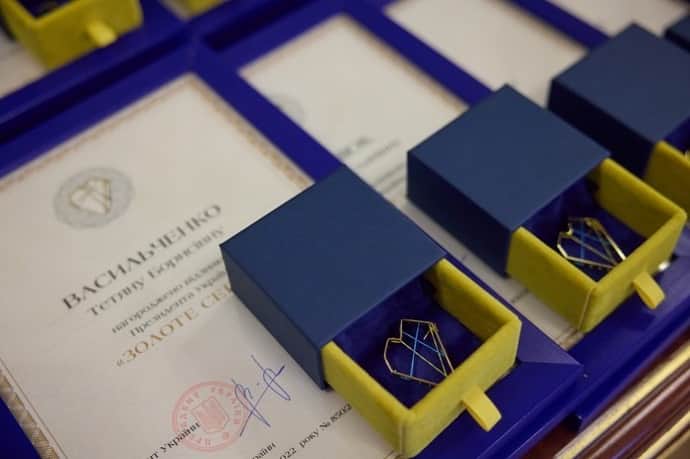 One of the awards won by the Ukrainian Women's Battalion
One of the awards won by the Ukrainian Women's Battalion
It was a whirlpool of emotions: we all cried because we didn't think we needed to be rewarded for our help. There is a war going on, and we must somehow survive.
I am grateful for those awards, but they cannot compare to the sacrifice of the military, who buy us each day of life in Ukraine. We had conflict over language in the team, some participants continuing to speak Russian and listen to Russian music. I had to say goodbye to those I couldn't convince to change.
Now the team consists of 80 people, a lawyer, an accountant, and several different departments for advertising, communications, purchasing, etc.
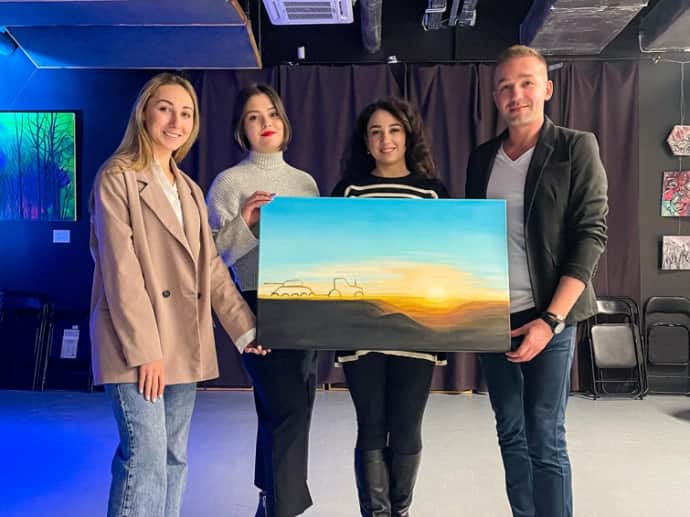 Diverse volunteer activities
Diverse volunteer activities
Unfortunately, fundraising remains a challenge. People need to continue donating throughout the war, not just when something catches their attention (for example, the blowing up of the Kakhovka Hydroelectric Power Plant). To make up for this, we don't just raise funds, but also allow people to buy things themselves, including T-shirts, medicines and other items.
We also have a project called "Voice of a Woman", where Ukrainian women can apply for psychological support, and tell their stories from the war.
Victoriia Andrieieva, Ukrainska Pravda.Zhyttia
Translators: Myroslava Zavadska, Yuliia Kravchenko
Editor: Bea Barnes